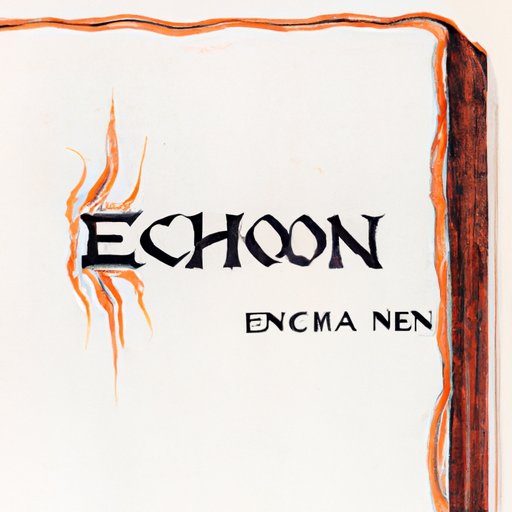Introduction
If you’ve ever studied the Bible, you might have noticed that the Book of Enoch is missing. Despite being a popular text among early Christians, it was never included in the Bible canon. This has led to much speculation and controversy over the years as to why this book was removed from the Bible. In this article, we’ll explore the history, content, and controversy surrounding the Book of Enoch and try to find some answers to this question.
Historical Context Approach
The Book of Enoch was written between the 2nd century BCE and the 1st century CE by a Jewish author, who claims to be Enoch, the great-grandfather of Noah. It was originally written in Aramaic and was one of the most popular Jewish texts during the Second Temple period. It was also a part of the Ethiopian Orthodox Church’s Bible canon.
It is unclear how the Book of Enoch became a part of the Bible canon, and some scholars believe that it was not considered for inclusion because its authorship was uncertain, and it had never been accepted as part of the Jewish canon. Furthermore, it contained many non-canonical characteristics such as revealing secrets of heaven and its hierarchy, and the origin of the giants.
During the 4th century CE, disagreements arose among Christian theologians over what texts should be included in the Bible canon. Several church councils were held to approve certain texts and reject others. One of the main arguments against the inclusion of the Book of Enoch was that it had never been accepted into the Jewish canon.
Textual Analysis Approach
The Book of Enoch contains apocalyptic literature, prophecy, and visions. It is heavily influenced by pagan and Jewish traditions and contains stories about fallen angels, giants, and the judgment day. It also presents a unique interpretation of the flood narrative, in which the angels that came to earth are held responsible for the corruption of the human race, and hence a flood was needed to cleanse the earth.
One of the main differences between the Book of Enoch and other books in the Bible is that it presents a different cosmology and the concept of the hierarchy of angels. The book of Enoch claimed to unveil insights into heaven, where it presents God’s throne room, the nine orders of angels, and the significance of names.
Some scholars argue that these differences might have caused the Book of Enoch to be removed from the Bible because it conflicted with mainstream theological views. These differences were probably caused by the book’s unique origin story of an actually living ante-diluvian prophet sent to the Heavens.
Theological Perspective Approach
The Book of Enoch was a popular text among early Christians and was even quoted by Jude in the New Testament. Many early Christian groups took the book seriously and considered it an authoritative text. Despite this, it never made it into the Bible canon, partly because it presented teachings that conflicted with mainstream views both in Judaism and Christianity.
For example, the book’s assertions that the departed souls’ spirits still existed and could be judged prior to the final judgment contradicted some Christian beliefs at that time. Other features such as mention of fallen angels led to controversial views that were not well-received in society. Hence, the differences in teaching might also have contributed significantly to its removal as an authoritative text.
Conspiracy Theory Approach
The exclusion of the Book of Enoch from the Bible has led to widespread speculation and conspiracy theories, which have added more fuel to the fire. Some people believe that the book was intentionally kept out of the Bible because it included material that would contradict mainstream Christian doctrines. They believe that the church was trying to suppress certain ideas and views that didn’t align with their beliefs.
However, most historians and scholars do not support these claims, and there is no evidence to suggest that there was a deliberate attempt to keep the Book of Enoch out of the Bible. Claims that this is the case are mainly based on subjective interpretations of history.
Relevance Today Approach
Despite its exclusion from the Bible, the Book of Enoch remains highly revered by some religious communities. Its unique content and teachings still fascinate many people, and the book continues to inspire believers around the world.
The book has also been used in the literary, historical, and philosophical fields. Many historians and scholars have found the text to be a valuable source of information about the Second Temple period and apocalyptic literature. Likewise, the book has been instrumental in inspiring the works of Dante and Milton, as well as the development of some religious practices.
Conclusion
In conclusion, the Book of Enoch’s exclusion from the Bible canon remains a mystery to many. Although there are certain debates surrounding the authorship and canonization of the text, it is likely that the unique cosmology and views contained therein caused the Book of Enoch to be excluded from the Bible. Despite this, the book is still highly revered by some religious communities and continues to be a vital source of information on Second Temple Judaism.
Further research on the topic may lead to more comprehensive theories and arguments surrounding the Book of Enoch, including more objective reasons for its exclusion from the Bible.
